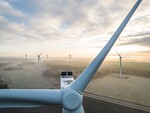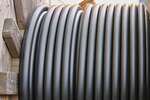02/07/2006
Wind turbines kill raptors and lead to rat infestations
Predictions by bat experts that expanded industrial wind farms in West Virginia will increase numbers of disease-carrying mosquitoes and crop-destroying grasshoppers, locusts, and moths are not the only expected ecological consequences of expanded wind farms. Giant wind turbines take an even greater toll on birds, including many endangered species and birds of prey instrumental in controlling rodent populations. According to the December 18, 2005 Riverside, California Press-Enterprise, up to 1,300 birds of prey are killed each year at Northern California's Altamont Pass wind farm alone.
Residents near California's smaller San Gorgonio Pass wind farm report that even in an area with far fewer wind turbines than Altamont Pass, the declining number of birds of prey associated with the wind farm is causing an ever-worsening rat infestation. According to the Press-Enterprise, longtime residents Nancy and Peter Wright have witnessed a steady decline in golden eagles, red-tailed hawks, and barn owls near their San Gorgonio-area home. At the same time, report the Wrights, rats have begun taking over. "The only thing that's changed out here is the presence of the windmills," Nancy Wright told the Press-Enterprise. Peter Wright reports he must engage in "rat wars" on daily basis. The rats nest in his palm trees and devour the backyard citrus he used to pick and eat. It's a regular job, rat catcher," Peter Wright told the Press-Enterprise.
Another San Gorgonio resident, Xandi Shaw, has brought three new cats to her home in an attempt to keep the rats at bay. However, "other than the coyotes, there's nothing out there rats are scared of," Shaw told the Press-Enterprise. "I've never seen it as bad as now." Other neighbors report rats becoming so prevalent and bold as to move right into area homes and establish nests. Daniel Patterson, a desert ecologist with the Center for Biological Diversity in Joshua Tree, California, confirmed it is commonly believed the deaths of birds of prey at wind farms lead to booming rat populations. "It's possible there is a connection; it needs to be investigated," agreed Kelly Fuller, spokeswoman for the Sierra Club's California/Nevada Desert Committee. "All of nature is connected: You pull on one place, it moves in another."
"All forms of power entail environmental trade-offs," said Alex Avery, director of research and education for the Hudson Institute's Center for Global Food Issues. "Wind power fares especially poorly in this equation. Wind turbines are absolutely devastating to wildlife," Avery explained, "and in particular to wildlife that greatly benefits humans. Small birds and bats control harmful insects such as disease-carrying mosquitoes and crop-destroying moths, while birds of prey control rat populations. For all this environmental damage, wind turbines produce only intermittent, undependable, and quite expensive power." Other energy sources are much "greener," Avery said. "Nuclear power, with zero emissions and a very small ecological footprint, is perhaps the most environmentally friendly power source," Avery noted. "Beyond that, hydropower produces far more power, far more cheaply, and with a similar or reduced environmental impact as compared to wind turbines."
Residents near California's smaller San Gorgonio Pass wind farm report that even in an area with far fewer wind turbines than Altamont Pass, the declining number of birds of prey associated with the wind farm is causing an ever-worsening rat infestation. According to the Press-Enterprise, longtime residents Nancy and Peter Wright have witnessed a steady decline in golden eagles, red-tailed hawks, and barn owls near their San Gorgonio-area home. At the same time, report the Wrights, rats have begun taking over. "The only thing that's changed out here is the presence of the windmills," Nancy Wright told the Press-Enterprise. Peter Wright reports he must engage in "rat wars" on daily basis. The rats nest in his palm trees and devour the backyard citrus he used to pick and eat. It's a regular job, rat catcher," Peter Wright told the Press-Enterprise.
Another San Gorgonio resident, Xandi Shaw, has brought three new cats to her home in an attempt to keep the rats at bay. However, "other than the coyotes, there's nothing out there rats are scared of," Shaw told the Press-Enterprise. "I've never seen it as bad as now." Other neighbors report rats becoming so prevalent and bold as to move right into area homes and establish nests. Daniel Patterson, a desert ecologist with the Center for Biological Diversity in Joshua Tree, California, confirmed it is commonly believed the deaths of birds of prey at wind farms lead to booming rat populations. "It's possible there is a connection; it needs to be investigated," agreed Kelly Fuller, spokeswoman for the Sierra Club's California/Nevada Desert Committee. "All of nature is connected: You pull on one place, it moves in another."
"All forms of power entail environmental trade-offs," said Alex Avery, director of research and education for the Hudson Institute's Center for Global Food Issues. "Wind power fares especially poorly in this equation. Wind turbines are absolutely devastating to wildlife," Avery explained, "and in particular to wildlife that greatly benefits humans. Small birds and bats control harmful insects such as disease-carrying mosquitoes and crop-destroying moths, while birds of prey control rat populations. For all this environmental damage, wind turbines produce only intermittent, undependable, and quite expensive power." Other energy sources are much "greener," Avery said. "Nuclear power, with zero emissions and a very small ecological footprint, is perhaps the most environmentally friendly power source," Avery noted. "Beyond that, hydropower produces far more power, far more cheaply, and with a similar or reduced environmental impact as compared to wind turbines."
- Source:
- James Hoaree - The Heartland Institute
- Author:
- Edited by Trevor Sievert, Online Editorial Journalist
- Email:
- press@windfair.net
- Keywords:
- wind energy, wind power, wind farm, wind turbine, rotor-blade, offshore, onshore, renewable energy









